NEW YORK CITY
February 24, 2013
STRANGER: David Rogers-Berry
LOCATION: Mesa Coyoacan, 372 Graham Avenue, Brooklyn, New York City
THEME: Lunch with a goth country musician
Slow and steady wins the race, so says the idiom.
It appears to be a philosophy for David Rogers-Berry and the fellow members of the New York-based goth country band O’Death, which he created several years ago. They’ve had opportunities to tour non-stop and potentially hit the big time, but that path was fraught with the risk of ruining personal relationships and making it more about getting noticed than making music. And as I learned during a lunch with David, integrity is everything to him.
“I’m not interested in chasing dollar bills. Some people waste their lives away in jobs they hate just so they can afford rent in a shitty apartment on the outskirts of town. I’m not trying to live like that. That shit is for the birds,” he said. For the five members of O’Death, “Our highest priority is integrity. It’s always more important to us to have integrity than to blow up.”
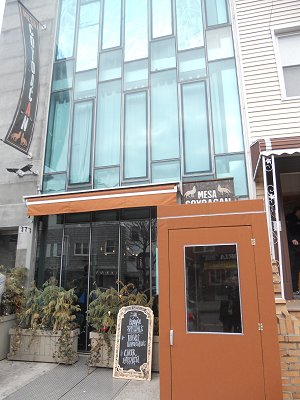
David and I met at the small restaurant Mesa Coyoacan on a breezy Sunday. Always willing to admit my ignorance, I had not heard of O’Death and instead the interview was arranged via Katelan Foisy — interviewee number 46 on this site and one of David’s friends.
If David, a chatty 30-year-old, had any doubts about meeting a random British guy in Brooklyn and breaking bread (or more accurately, Mexican food) then he didn’t show it.
He was talkative from the start, even apologizing at least twice for being long-winded. No apology necessary, as he charted an interesting path from his childhood in South Carolina, his move to college in New York, life with O’Death and other musical endeavors, and personal battles including a fight with bone cancer, in which he came out victor.
The surgery forced some changes in his career. He’s no longer as aggressive on stage, compared to days when he’d jump up on his drums and hurl cymbals through the air. But he retains a strongly independent musician’s streak that he said is at odds with his upbringing.
Born in rural South Carolina, David grew up in a religious family. His father is a minister, his sister is a secretary of a church in Los Angeles, and his brother is a chaplain. “Religion was something my entire family latched on to, but there was a lot of secular culture in the house,” he said.
That culture included his father’s extensive record collection. “Our house had a lot of records, a lot of books, my parents were into film. For a pastor’s family it was also very liberal, especially by South Carolina standards. The secular culture really stuck with me a lot more than the religious stuff did. As a kid I went through the motions with the religious stuff, but when I went out on my own it didn’t stick. I just walked away and never went back,” David said.
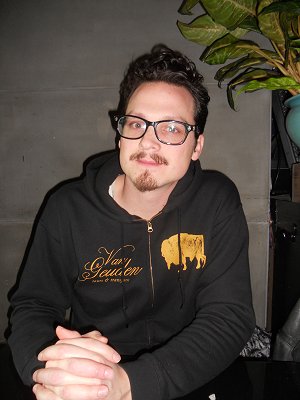
Disinterested in religion, David focused on something that really caught his ear — music. “I came to it not as a musician, but as a listener. The impact that music had on me was too profound to not go down that road. It was to the point where I didn’t really have an option.”
Bands and musicians he grew up listening to included the Talking Heads, The Clash, Elvis Costello and REM. As he got older his interests transitioned to edgier music. He describes listening to Nirvana’s Nevermind for the first time as a “genuinely life-changing” experience. “To my young ears it was so much different from the stuff my dad was listening to,” David said.
He was interested in playing music and experimented with some piano lessons, but it didn’t win him over. Then he learned snare drum and bass drum while playing for his high school’s marching band, and then everything changed when his parents bought him a drum kit for Christmas. His love affair with the drums was sealed, even though he says learning to play was hard work.
“I wouldn’t say I necessarily had natural rhythm, it didn’t come easy. Some people pick up an instrument and it comes second-hand to them. I had to practice a lot,” he said.
But South Carolina wasn’t offering the community or culture David was looking for as an artist, and so he moved to New York. He started college at the State University of New York (SUNY) Purchase, but he was unaware of courses on offer to study topics like pop music. “I really am from the sticks, man. I didn’t even know that was an option,” he said. And so he studied dramatic writing.
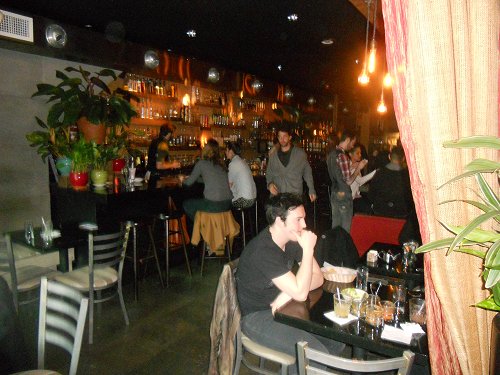
The course was fine, but he knew that music, not creative writing or acting, was where his future lay. He moved further in that direction after meeting fellow SUNY student Greg Jamie. Greg had rebuffed David’s attempts at friendships early on — “he ignored me thoroughly” — but David later learned Greg had been going through depression. When Greg started treating it, he opened up and the two hit it off, finding they shared similar interests, particularly with music.
Greg, who plays acoustic guitar in O’Death, was friends with yet another SUNY student, a banjo player named Gabe Darling. It was through Greg that David got to see both his new friend and Gabe performing at a cafe on campus, and he said, “I was totally enamored.”
Stylistically the two men were touching on stuff that interested David, which he described as dark folk music different from anything else widely available. He approached Gabe and Greg and asked if they wanted to start a goth country band, and that’s how O’Death began. They started as a three-piece but then a few months later brought on violinist Bob Pycior. Bass player Jesse Newman rounded out the five-piece band. But how did they settle on the name that they’d play under?
As our smiling, efficient waitress delivered our beverages — a Bloody Mary for David, orange juice for me, coffee for both of us — David told me the origins of the band’s name.
“O’Death” is a traditional American folk song not credited to any one author. The song has been covered by many different artists with very disparate versions. “It was that idea, that element of the disparate — this thing about folk music becoming a template for anybody’s personality, to be able to work inside this template. That connected with most of us in the band,” David said.
“We had no idea what the fuck we were doing”
With the line-up and name sorted, the band started playing around campus and at small parties, while writing their music. The writing process varies song to song, David said, sometimes with Greg showing up with an idea that they fill out together. Other times, someone in the band will have an idea that David will then work into something usable.
After two years, the members of O’Death started to get serious about the band, right around the time David graduated. He was the first to graduate from SUNY, saying with a grin that the other band members didn’t graduate on time. Eventually everyone relocated to New York City.
“We took a break after my graduation and I didn’t see those guys the entire summer, then in the fall we started slowly playing shows in the city. We had no idea what the fuck we were doing at all. We had no connections in the music industry,” David said, which led to some initial frustration.
Trying to figure out how to make it, David said, “I remember having a lot of meetings with Greg and Gabe about it. We were really banging our heads. We felt strongly we had a really great project, it was special and different, and we had a lot to offer. When people heard our music they really responded to it. All our friends were in bands, and I knew most of them sucked.”
In contrast to their friends’ more ramshackle efforts, “We knew O’Death was good, it was interesting, it was different, but that doesn’t mean shit when it comes to finding an audience. Quality is only the very first step in the process,” David said.
Initial gigs in 2004 and 2005 included a small coffee shop called The Matchbox that had a capacity of about 10, and various other locations that he rather directly called “shitty gigs.”
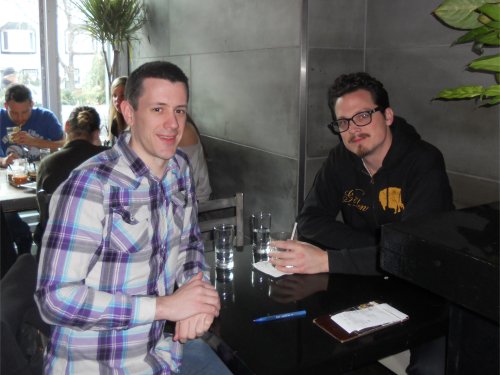
But there was one thing the band did that David said had a “huge impact” in terms of finding an audience. He’d been working as a DJ at the Apocalypse Lounge bar in New York (it’s since closed) and over time took on more responsibility until he was effectively managing the place. And so he decided to book a monthly party for O’Death to play the first Thursday of each month, making it a point of turning it into a show also featuring other bands.
Through that monthly party O’Death was able to make tangible connections in the New York City music scene that helped lead to bigger and better gigs — and new fans. “We were a lot more serious about it than a lot of the bands we were playing with, but they had a lot more friends on the party scene,” David said. “All of their friends would come out, and over the course of the next few months we found ourselves having fans that weren’t just our buddies from college.”
That’s how they got connected to what he described as the Brooklyn scene, playing warehouses or keg parties for hundreds of people, and things started to take off. They’d play constantly, sometimes as much as five times a week. And they started branching out to play some shows in Philadelphia. “We would never say no to anything,” David said.
Then O’Death started booking its own tours, with David organizing everything. They had no experience touring, but they went with the flow. And it worked.
“If you can make some noise in New York, that translates”
The “40 Days and 40 Nights” tour — a Biblical reference, appropriate for the son of a religious family — saw David and his band members on a non-stop road-trip covering all four corners of the mainland United States. “We went hard. It goes back to how we didn’t know what the fuck we were doing.”
But the go hard or go home strategy paid off, as the minute David posted the national tour dates to O’Death’s website, the band started to get emails inviting it to open for other acts in New York. “For the first time, legitimate venues were reaching out to us. From there we started to make our way in the independent music industry,” said David.
Things continued to grow, and O’Death began getting international recognition. “If you can make some noise in New York, that translates,” he said. Making it on the hipster Brooklyn scene meant that suddenly people in Berlin were paying attention, because apparently those Germans are devotees of everything new and hip in Brooklyn music. But overseas popularity has its limits.
“O’Death never really got a lot of breaks, we did everything the hard way, making one fan at a time,” David said. “Europe for us hasn’t taken off the same way the States did, and that has a lot to do with the integrity thing. In the States, when we tour, the people who come out are our people, they’re genuinely connected to the music. In Europe, because we were more tapped into the independent music industry, it was more about the hype.”
That’s not to say O’Death doesn’t appreciate its European supporters, and David said the band had a great time playing in Ireland, England, the Netherlands, Germany and Sweden, among other countries. And he’s hopeful they’ll tour overseas again.
Talk of overseas travel veered into a brief discussion about my home country of England, and I used that as a chance to tell David my wariness about the menu at Mesa Coyoacan. For the longest time I considered Heinz ketchup to be high on the spicy scale, so Mexican food is something I’ve inched toward slowly, given my inability to cope with anything with more of a kick than salt.

I figured I’d play it safe with the Huevos Rancheros — two fried eggs over a corn tortilla with salsa ranchera, cilantro, crema fresca, black beans and guacamole.
The description didn’t seem too threatening to my taste buds, but as I dug into the dish I was pleased with the mild tang of the sauce and the crispness of the tortilla. I’ve seen the dish offered on other brunch menus yet never ventured to try it, but based off how tasty it was I’d try it again.
David told me he’s often in the restaurant, usually preferring it as a place to get midday food on the weekends because other brunch places in Brooklyn tend to be packed.
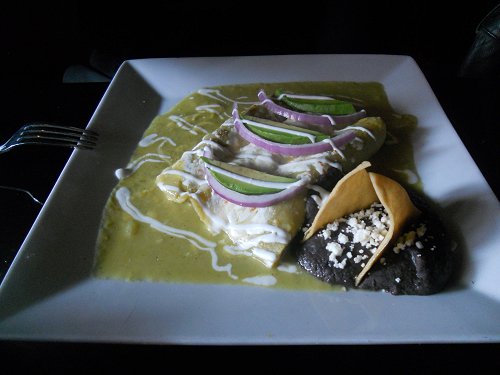
He opted for the Enchiladas Verdes — traditional green enchiladas with grilled skirt steak, topped with Oaxaca cheese, avocado, red onions and crema fresca. While I didn’t try any of his food, I’m guessing it was as good as mine because we both cleaned our plates.
While we were eating, conversation shifted from O’Death’s touring to some personal problems David experienced that meant the band project was put on hold for a while.
Five years ago, at the age of 25, he’d been engaged to a woman who died of an aneurysm in her sleep. “That was a very traumatic experience and things got a little crazy for me,” David said. All his belongings were in storage because he’d been touring so much, and the rest of time he was staying with his fiancee. But after she passed away, David was effectively homeless. While he didn’t sleep on the streets, he did experience a life without much structure, bouncing around friend’s couches.
For anyone to come through that experience and yet retain a seemingly mellow, friendly and knowing personality is amazing, and even more so given that just two years later David would get more terrible news when he was diagnosed with bone cancer.
He had osteosarcoma, a bone tumor in his shoulder. “Especially inconvenient for a drummer,” David said with a sly grin. From the outset his prognosis was good and he had what he described as a great surgeon. He had the tumor removed and his humerus bone is now a plastic replacement, encased in a cadaver donor bone. “So I’ve got a dead man’s bone in me,” he said.
“The first thing I did when I recovered was make a new record”
David concedes his arm will never be back at the strength of his pre-surgery days, and there are certain movements he can’t make. But adjusting wasn’t the hardest part of living through cancer.
The worst aspect for David was the fact that O’Death effectively took a two-year break while he recovered. “Not being able to be creative or make music or perform was the hardest part of being sick,” he said. “After I got out of treatment and was fully recovered, the first thing I did was make a new record with O’Death. That was high on my creative list.”
The band now has three albums and its style has changed with time — David said the shows might not be as crazy as they used to be, but they sound better.
As he considers the future of the band, his big focus is on “sustainability,” on ensuring O’Death will be around for years to come, and with the same line-up. “My band is fiercely loyal, which is highly unusual, especially in the New York music scene. We have never had any personnel changes since 2005, basically when we locked in our permanent bass player. Our band is our band, and the members are not interchangeable,” David said.
He’s eager to see the band gain a bigger audience and he’d love to make more money, for example from movie studios offering thousands of dollars to feature O’Death’s music on film soundtracks. But that’s not happening at the moment, a situation he’s learned to accept.
“It’s kind of hard to swallow this pill, a hard truth to face up to, but I’m interested in seeing this band around 15 years from now. I’m more interested in that than blowing up huge in the next few years and burning out,” David said. “I feel what we have is special. Sometimes that means saying no to opportunities. Some people destroy their lives for success, but that’s not fun.”
“Hungry March Band is very eclectic music”
While working to keep O’Death growing, David also stays occupied by playing with other musicians, including the Brooklyn street brass band known as Hungry March Band. His desire to throw himself further into creativity after surgery led to him looking for other options beyond O’Death for making music, and that’s the first project he got involved with outside the band. The marching band is “a really fascinating scene,” he said, and one that has toured across the states and even down to Colombia for what David says was a memorable run of sets in Bogota.
“It’s very eclectic music and that aspect of it really turns me on,” he said. “But it’s also a logistical fucking nightmare. The beast doesn’t have a head, there’s no centralized leadership, and with any type of band that has a huge impact on the functionality of the project. It’s more like a consensus process — people come and go, and the thing keeps going. It’s a New York institution.”
His other priority these days is composing and recording his own music. “I have a lot more freedom to do what I want, which takes me to different places,” David said. Those nascent efforts aren’t necessarily ready for prime-time solo performances on stage, but it’s good work nonetheless, he said.
David’s also hoping to branch out into teaching younger people to play the drums, though he notes that he’d also have to get a tutor for that to work, showing him new tricks. “I never had any private lessons. It’s not something I’m proud of, and I’m trying to change that because I’m interested in teaching. I’m coming late to the game to find a teacher so that I can teach others. But it’s never too late. Any serious musician recognizes there’s always room to grow,” he added.
Although he’s got a wide range of projects on the go, O’Death remains his first love and top priority. And it’s clear he’s got a lot of affection for the band, for which he’s the manager.
They previously had a manager for a few years, but David said that while the guy worked hard for them, he didn’t really understand O’Death’s philosophy, which comes back to integrity — focusing on the quality of the music rather than hype and money.
“Business-wise that hurts us sometimes. But in terms of longevity, after being around as long as we have, our audience understands us and where we’re coming from. They connect with our integrity. The people that come to our shows are deeply connected to our music” rather than to see what they’re heard is the hottest new thing, he said.
Manager, drummer, composer, budding teacher — it’s a creative life for David, even if that means it’s not the most lucrative. And he seems to accept the tradeoff.
With a grin, David said, “I stay busy. Busy and broke, man.”